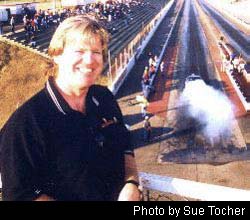
ORSCA Enters its Next Phase
11/8/05

 s its third season approaches, the Outlaw Racing Street Car Association (ORSCA) is facing a pivotal time. In fact, 2006 may well determine the long-term viability of the Atlanta-based sanctioning body.
s its third season approaches, the Outlaw Racing Street Car Association (ORSCA) is facing a pivotal time. In fact, 2006 may well determine the long-term viability of the Atlanta-based sanctioning body.
I always considered ORSCA’s first year practically a “gimme,” with everyone just happy to finally have a semblance of organization bestowed on what had previously been a true outlaw existence—exciting and potentially profitable, but hardly secure, either financially or physically. Under founder Johnny Fenn’s leadership, ORSCA had introduced a strong measure of predictability from both monetary and safety standpoints, as well as offered the chance to name undisputed champions and record holders. And you only had to see 2004’s winners proudly sporting their championship jackets at the track this spring to realize how much those little number ones on the windshields meant to them.
Although the points chase dropped from eight to just six events this season, 2005 came with more outside backing, visits to bigger and better tracks, and generally, a smoother running program—probably the single greatest improvement over ORSCA’s rookie effort.
Still, Fenn said this year was more challenging for ORSCA than its first go round. “We made some promises based on promises made to us … by sponsors that never materialized. And I learned real well not to make promises on promises.”
Beyond making overreaching promises, I think ORSCA also has to be cautious about adding too much to the show. Like NHRA realized in recent years, you really can have too much of a good thing, which ultimately leads to unpopular cutbacks. Better to control the scope of the event now, and with five official classes, along with occasional automatic Pro Mod accompaniment, ORSCA currently completes its events in reasonable time. That was not always the case, though, as several races in 2004 proved, culminating in the interminably long 2004 season ender at Huntsville, where more than 420 cars competed on raceday.
“I won’t ever get caught in that trap again,” Fenn stated. “I think just the right amount of classes and just the right amount of cars is the key. I know everybody wants to see all the cars in the world come, but you have to sit and figure how much racing you can actually get done in a weekend.”
That said, Fenn admitted a new 5.30 index class remains a real possibility for the 2006 season and outlaw Pro Mods may be on the bill, too. Regardless, a key factor in any new class adoption will be the requirement to meet all NHRA certification standards.
“Our outlaw guys have busted their butts to get licensed, checked, and certified so we can take them anywhere in the world. I’m not sneaking another car into any racetrack and I don’t care if they’re some big shot Pro Mod guy or not. If anyone wants to race with ORSCA, I don’t care who they are, they’re going to have to do the same thing. If not, the only way they’ll be at our race is if they sit their butt in the stands with the spectators.”
On another level—and I’ve said this before—ORSCA needs to get a better handle on maintaining and issuing results and standings, both at the track and after the fact. ORSCA relies heavily on its Internet presence to get its message out and PR director Karen Bryant is quick to post basic race results, but a woefully long time can elapse before accurate points updates are compiled after an event, which is frustrating to entrants and fans (and journalists!) alike.
One method of further spreading the word floated by Fenn in a recent message board post on ORSCA’s Web site, weighed the idea of “broadbandcasting” next year’s races over the Internet. The response was generally positive, but I remain skeptical. I don’t care how many answered the straw poll, I just don’t think something like that would have any staying power.
